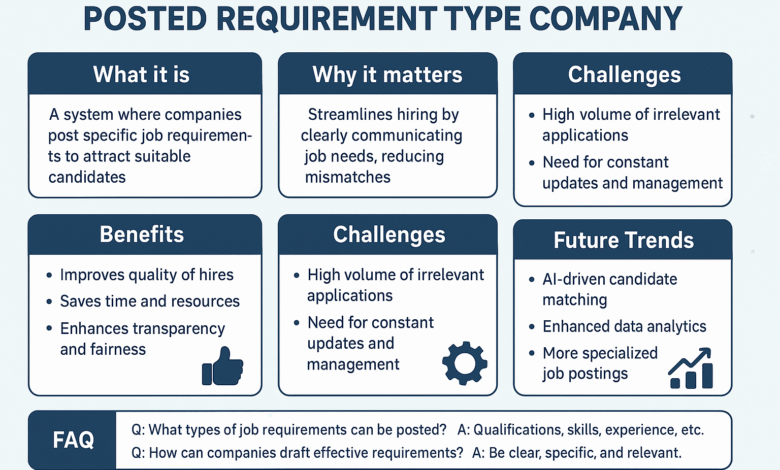Understanding PostedRequirementstypeCompany in Modern Business

In today’s highly digital and fast-paced marketplace, businesses are changing the way they communicate, collaborate, and meet their operational demands. One term that has gained importance in this context is postedrequirementstypecompany. Though it might sound technical, this concept plays a vital role in helping companies connect with suppliers, streamline procurement processes, and create meaningful partnerships.
This article explains the meaning of postedrequirementstypecompany, why it matters, its applications across industries, and the best practices companies can follow. Additionally, we’ll look into challenges, future possibilities, and provide FAQs for better understanding.
What Does PostedRequirementstypeCompany Mean?
The term postedrequirementstypecompany is best understood by dividing it into three parts:
-
Posted Requirements: The needs or requests a company publicly shares, whether for raw materials, technology, human resources, or specialized services.
-
Type: The category of the requirement, such as IT, logistics, consulting, or construction.
-
Company: The business posting the requirement, which signals its demand to potential suppliers.
In simple terms, postedrequirementstypecompany refers to how a business shares its specific needs in a structured digital platform. It is like creating a visible digital footprint of demand, allowing vendors and suppliers to identify opportunities that match their services.
For example, a tech company could post a requirement for cybersecurity services, including details about the scope, compliance standards, and deadlines. This makes it easy for specialized vendors to prepare proposals that align with those expectations.
Why Posted Requirements Are Important
Businesses today don’t work in isolation. They are part of supply chains that depend on speed, transparency, and trust. Posting requirements has become a strategic move for several reasons:
1. Faster Procurement
Traditional procurement takes time due to back-and-forth communication. With postedrequirementstypecompany, companies simplify the process, reducing delays.
2. Better Market Visibility
When requirements are posted clearly, suppliers see the company as a reliable buyer. This attracts serious vendors who want to build long-term partnerships.
3. Competitive Advantage
Clear postings often help companies get better deals and innovative solutions faster than competitors.
4. Stronger Supplier Relationships
Suppliers benefit from knowing exactly what is required, allowing them to customize offers and build trust with the company.
The Role of Digital Platforms
The growing use of B2B marketplaces, procurement software, and professional networks has made postedrequirementstypecompany highly effective. Some examples include:
-
B2B Marketplaces (like Alibaba, IndiaMART): Companies post requirements, and suppliers compete to fulfill them.
-
Procurement Systems (like SAP Ariba, Coupa): Internal teams post needs, vendors respond, and contracts are finalized digitally.
-
Professional Platforms (like LinkedIn): Businesses post opportunities, projects, or requests for collaborations.
The principle is simple: visibility ensures faster and more efficient supplier-buyer connections.
Best Practices for Posting Requirements
Not every posting attracts the right suppliers. For postedrequirementstypecompany to be effective, companies should follow these best practices:
-
Be Specific but Concise – Instead of saying “need IT services,” specify “require cloud migration within three months for retail operations.”
-
Categorize Clearly – Label the requirement under the correct type, such as logistics, IT, or construction.
-
Provide Context – Mention the company’s size, industry, and project scale to help suppliers tailor responses.
-
Set Realistic Timelines – Avoid deadlines that are too short, as they may discourage quality bids.
-
Include Compliance Standards – For industries like healthcare or construction, compliance details are critical.
Real-World Applications
The use of postedrequirementstypecompany appears across multiple industries:
-
Manufacturing: Factories post needs for raw materials or logistics services to avoid production delays.
-
Technology: IT firms share requirements for developers, software tools, or cybersecurity solutions.
-
Construction: Contractors post requirements for safety equipment, subcontractors, or design services.
-
Healthcare: Hospitals post needs for medical supplies, skilled staff, or diagnostic equipment.
Challenges and Pitfalls
While useful, postedrequirementstypecompany also comes with challenges:
-
Overposting: Too many vague postings can overwhelm suppliers.
-
Security Risks: Sharing too much detail may reveal sensitive business strategies.
-
Information Gaps: Incomplete postings waste time for both suppliers and buyers.
-
Platform Dependence: Relying on a single platform may limit supplier diversity.
The Future of Posted Requirements
With advancements in technology, postedrequirementstypecompany will continue to evolve:
-
AI-Powered Matching: Artificial intelligence will match company needs with the most suitable suppliers.
-
Blockchain Smart Contracts: Automatic and transparent compliance checks will become the norm.
-
Predictive Postings: Data-driven tools may predict company requirements before they’re officially posted.
This evolution will make procurement more proactive, transparent, and efficient.
Conclusion
The idea of postedrequirementstypecompany might appear technical, but it reflects a major shift in business practices. Clear and well-categorized requirement postings empower companies to save time, attract the right suppliers, and build trust-based relationships.
As digital tools advance, businesses that master this practice will not only streamline procurement but also gain a competitive edge in their industries.
FAQs About PostedRequirementstypeCompany
Q1. What is postedrequirementstypecompany?
It is the process where companies share their specific needs (requirements), categorized by type, within a digital platform to attract suitable suppliers.
Q2. Why is postedrequirementstypecompany important?
It saves time, improves visibility, strengthens supplier relationships, and gives companies a competitive edge.
Q3. Which industries use postedrequirementstypecompany?
Industries like manufacturing, technology, healthcare, and construction frequently use it to connect with reliable suppliers.
Q4. What are the risks of postedrequirementstypecompany?
The main risks are overposting, vague information, and potential exposure of sensitive business data.
Q5. How will postedrequirementstypecompany change in the future?
With AI, blockchain, and predictive analytics, it will become more accurate, transparent, and proactive.
Read also:Business Insight Shopnaclo: Driving Growth and Innovation for the Future



